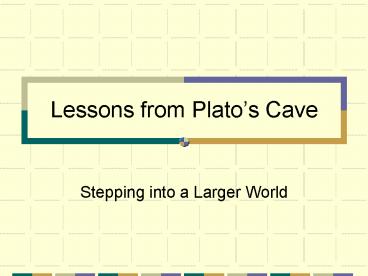Lessons from Plato PowerPoint PPT Presentation
Title: Lessons from Plato
1
Lessons from Platos Cave
- Stepping into a Larger World
2
Lessons from Platos Cave
- Transformational Learning Education that
significantly changes the students knowledge,
desires, and way of life, as seen in the
enlightened prisoner. - Can education foster substantive change in the
thinking and living of students? - To what extent does sin and the sin nature
inhibit life change educationally? To what extent
does redemption make life-change possible? - Why are we so resistant to change and comfortable
with custom and convention?
- What should teachers do as a prerequisite
exercise to pique students curiosity and make
them open up to the teaching and learning
process? - What content, example, teaching methods are
pre-eminently effective? - Are teachers themselves lovers of wisdom, models
of curiosity and wonder, motivated to learn, open
and receptive to truth, and in short, solid
examples of what they say they want their
students to be?
3
Lessons from Platos Cave
- The condition of learning the personal condition
in which people approach the learning process - According to the cave analogy, the human
condition (since childhood) is one of ongoing
darkness (in an underground, cave-like
dwelling) and slavery (fixed in the same
place) and as a result people are unable to know
the truth (their bonds prevent them from turning
their heads around). - To learn, they will have to be set free from
their prison, from their as yet unrecognized
ignorance (of themselves, others, things, and the
language used to describe things, by some kind of
agent of freedom and change
- In what condition to Christian students arrive on
campus and are they capable of learning in this
condition?
4
Lessons from Platos Cave
- Liberating Learning Education can set students
free from blindness, foolishness,
closed-mindedness, narrow-mindedness, and pride. - Plato states that the whole goal of education is
for students to be released from intellectual
bonds and cured of their deep ignorance. - This is known as liberal, that is, liberalizing
education, and from a Christian point of view,
cannot truly be achieved apart from the
liberation from sin, death and satan supplied by
Christ and the grace of the gospel.
5
Lessons from Platos Cave
- Coercive learning Education that is forced or
compulsory. - In Platos language, a student is freed
(passive voice) and compelled to make
discoveries that would otherwise remain
undiscovered (to stand up, turn your head, and
look up toward the light).
- This kind of coercive learning is required by the
nature of fallen human nature and is present in
any academic system that imposes a variety of
rules, regulations, requirements, and grades on
students who otherwise would probably not apply
themselves voluntarily to the teaching, studying,
and learning process.
6
Lessons from Platos Cave
- Hard or Difficult learning Education is not
easy, but is a taxing and arduous process. - As Plato points out, the exit to the cave is a
long way up and when students begin to learn,
they will be pained and dazzled as well as
shocked and in a state of disbelief at what they
are learning. - A part of the difficult lies in the discovery
that their previous beliefs are false and thus
inconsequential. - Because of the arduous nature of the educational
process, progress is often very slow.
- Students will even resist new discoveries
strenuously and flee from them, and seek to
return to old convictions. - But a good teacher will force the student on, and
not let him/her give up, but will press for more
discoveries that will require even more time to
adjust to.
7
Lessons from Platos Cave
- Gradual or incremental learning Education is a
slow process and personal change takes place
incrementally. - Plato suggests that learning is indeed a slow,
gradual process in which a student moves from
strong resistance to learning to deep affinity
for the truth discovered. - Once a student has discovered Truth, and recalls
his formed condition and its false wisdom, and
his deceived and enslaved friends, he feels a new
happiness at his discoveries, and feels sorry for
his former companions,
- He would care nothing for them or their honors or
opinions or ways of life.
8
Lessons from Platos Cave
- Persecution for learnings sake. Those who take a
deep interest in education are often ridiculed
and rejected by those who fail to see its value.
Why read and study when you can party! - Plato reveals that attempts to share ones
educational discoveries of the Truth with
benighted friends can result in ridicule,
rejection, and even death (so Socrates and
Christ). - To the uneducated, the educated appear silly,
awkward and just plain weird. They are unwilling
to change.
9
From the Goldfish Bowl to the Open Sea!

